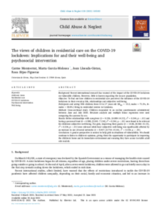Background:
Recent international research has warned of the impact of the COVID-19 lockdown on vulnerable children. However, little is known regarding the in-care population. Objective: To find out how children in residential care perceived the influence of the COVID-19 lockdown in their everyday life, relationships and subjective well-being. Participants and setting: 856 children from 10 to 17 years old (Mage = 15.5, males = 71.2%, females = 28.8%) living in residential centres in Catalonia.
Methods:
Cross-sectional study. Children responded to an on-line questionnaire administered between June and July 2020. Bivariate analysis and multiple linear regression were used comparing the answers by sex. Results: Better relationships with caregivers (β = 9.156, [4.089–14.22], r 2 = 0.244, p < .01) and having a person of trust (ß = 4.588, [2.041–7.134], r 2 = 0.244, p < .01) were found to be relevant for children's subjective well-being. For girls, improving their grades (β = 14.86, [8.560–21.15], r 2 = 0.234, p < .01) were relevant while boys' subjective well-being was significantly affected by an increase in use of social networks (β = 8.917, [2.733–15.10], r 2 = 0.234, p < .01).
Conclusions:
A gender perspective is needed to help girls in situations of vulnerability. We should continue to listen to children's opinions, giving them the opportunity to participate in improving the children's home and its immediate environment and ensuring they have access to stable adult role models.

